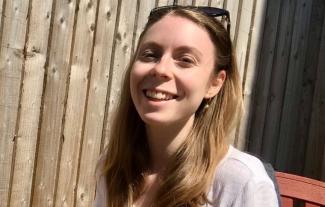I can't wait to be a therapist & be part of the community

Speech & language therapy student Laura Richter tells us what made her want to become a therapist, as well as the nerves she feels about entering the profession.
My name is Laura and I am a 26-year-old student who has just started the journey to becoming a qualified Speech & Language Therapist (SLT). I wanted to share some of my experiences, as well as some of my worries going into this next chapter of my life.
Having grown up bilingual, I have always been intrigued by language acquisition and abilities. Born in Germany and raised in Belgium, I grew up speaking and hearing German, English, French, Dutch and Spanish. I attended international schools where I was surrounded by different languages, and quickly became intrigued by speech impediments and disabilities, and their impact on peoples' psychological and social wellbeing.
I have spent the last 5 years working in mental health and now want to expand my skills to become a qualified SLT so that I can provide life-changing treatment, support and care for those in need.
Learning and listening
My first encounter with an SLT was through a friend who had a lisp, when I was in primary school. The therapist would ask my friend to place edible paper inside her mouth and within weeks of using this technique combined with various exercises, her lisp slowly faded and her self-esteem increased. It was so moving to watch her blossom into this assertive and confident person and this memory has stayed with me ever since.
However, the first time I really experienced the impact of communication disabilities was whilst I was working as a mental health support worker in a psychiatric care unit. There I worked closely with patients suffering from a variety of mental illnesses and learnt how they struggle to communicate to — not only because of physical difficulties with speaking, swallowing, eating or drinking, but also psychological barriers and social difficulties. Being actively involved in delivering care, treatment and rehabilitation was incredibly rewarding. It was the first time I saw the work that multi-disciplinary teams and therapists do.
I was surrounded by different languages, and quickly became intrigued by speech impediments and disabilities, and their impact on peoples' psychological and social wellbeing.
I made it my priority to get to know the patients individually and listen to them. Many of the wonderful people I met there said that their freedom had been taken away, and that they were not given an opportunity to really explore their words and feelings. The first thing I did every morning was to ensure I spent time with every patient and listen to their thoughts, feelings and worries.
Following this, I moved jobs to a Special Educational Needs school where I worked closely with children and young people with ADHD, ASD and other social, emotional and mental health difficulties, as well as communication disorders such as selective mutism. This experience gave me the opportunity to see what a huge part communication plays in the daily lives of young people who struggle to express themselves. I worked with students who had been bullied because of their diagnoses to the point where the idea of school became so overwhelming that they refused to attend. Furthermore, many of the students came from low-income or disadvantaged families and had never had the type of support that we offered, let alone people that were willing to take the time to listen. It became really clear to me that I wanted to help these young people, as well as their families, to confidently express themselves and again, be the person that listens to them.
My background has allowed me to explore language and communication as a vital skill, which many of us (including myself at times) take for granted. It's allowed me to support language development — be it in a child with a delay in acquiring language; a young adult struggling with a stammer; an adult who has suffered a stroke or brain injury; or an elderly person affected by dementia and losing their speech.
Interest in stammering
Stammering has been an interest of mine for a long time. I think what has drawn me in and what I find particularly remarkable is the resilience that people who stammer show. I can only imagine what it must be like to be constantly talked over or interrupted, and have people finish your sentences because they are trying to help or if they think you're 'taking too long'.
However, I am nervous that I might get it wrong sometimes. That I can't fully put myself into someone else's shoes; nervous that when I say, "I understand what you're going through", maybe that isn't quite true.
From the stories I have read on stamma.org and elsewhere, people who stammer have shown time and time again that with the right support and a little bit of patience, they can communicate just as well as anybody else. There are countless incredible SLTs, support groups and volunteers who all give that opportunity back to the people and that's why I can't wait to be a therapist — to be part of that community!
Nerves
Starting this journey, I am incredibly eager to learn and expand my skills and knowledge, and I am grateful to have the opportunity to work in such a rewarding job.
However, I am also nervous. Nervous that I might get it wrong sometimes. That I can't fully put myself into someone else's shoes; nervous that when I say, "I understand what you're going through", maybe that isn't quite true. I'm nervous that other therapists are far more experienced and confident than me. I'm nervous that I might not be able to fully appreciate what people who have communication difficulties go through on a daily basis; and that I might make mistakes and not pick up on them.
But if I have learnt anything in my 26 years, it's that every single person on this earth has the right to communicate their wants, needs, wishes and desires. If I can help even one person with their difficulties, then I know it will have been worth it.
Read more Your Voice articles from our supporters.
Would you like to write something yourself? See Submit Something For The Site or email editor@stamma.org for details.

































